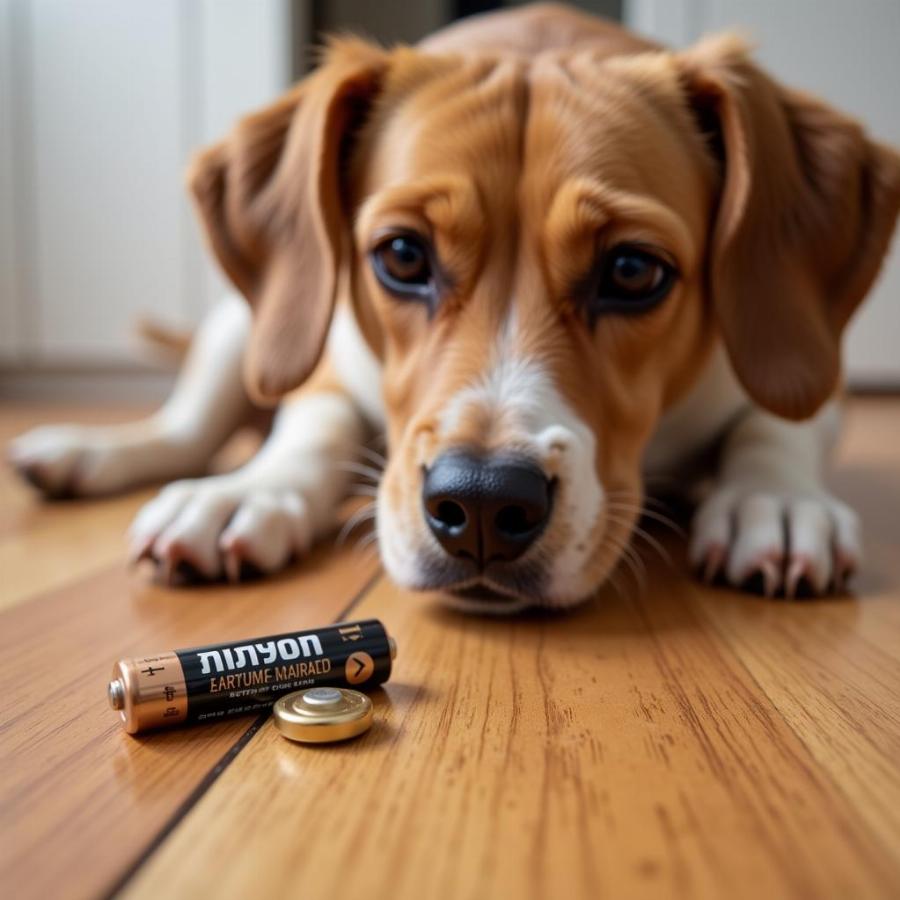A dog eating a battery can be a terrifying experience for any pet owner. Knowing the symptoms of dog eating battery is crucial for quick action and potentially saving your furry friend’s life. This article provides a comprehensive guide to recognizing the signs and taking the necessary steps if your dog ingests a battery.
Recognizing the Signs: What Happens if a Dog Eats a Battery?
If your dog swallows a battery, it can cause a range of serious health problems. The battery’s chemicals, such as alkaline or lithium, can leak and cause burns to the mouth, esophagus, and stomach. Additionally, the battery itself can obstruct the digestive tract. So, what are the symptoms of dog eating battery to look out for?
- Excessive drooling: One of the earliest and most common symptoms is sudden and excessive drooling. This is often a direct response to the chemical burns caused by the battery in the mouth and throat.
- Pawing at the mouth: Your dog might paw at their mouth or rub their face on the ground due to discomfort and pain.
- Vomiting: Vomiting can occur as the body tries to expel the foreign object.
- Loss of appetite/Refusal to eat: Pain and discomfort in the mouth and throat can make it difficult and painful for your dog to eat.
- Difficulty swallowing: If the battery lodges in the esophagus, it can cause difficulty swallowing or painful swallowing.
- Lethargy/Weakness: Your dog may seem unusually tired or weak.
- Abdominal pain: If your dog exhibits signs of abdominal pain, such as whining, guarding their belly, or adopting a hunched posture, it’s a serious sign.
- Black stools: Black, tarry stools can indicate internal bleeding caused by the battery’s corrosive effects.
- Changes in breathing: Difficulty breathing or rapid breathing could be a sign of a blocked airway or other serious complications.
 Chó ăn pin
Chó ăn pin
What to Do if Your Dog Eats a Battery: Immediate Action is Key
Suspect your dog ate a battery? Don’t wait! Immediate action is vital.
- Contact your veterinarian or an emergency animal hospital immediately. Time is of the essence. The sooner your dog receives treatment, the better the chances of a full recovery.
- Do not induce vomiting unless instructed by your veterinarian. Inducing vomiting can sometimes worsen the situation, especially if the battery has already started to leak.
- If possible, identify the type of battery ingested. This information will help your veterinarian determine the best course of treatment.
- Bring any packaging or remnants of the battery with you to the vet.
Diagnostic Tests and Treatment Options
Your veterinarian will likely perform several tests to determine the location and extent of the damage caused by the battery. These tests may include X-rays, endoscopy, or blood tests. Treatment options will vary depending on the type of battery, the location of the battery in the digestive tract, and the severity of the damage. Treatment may involve endoscopic removal, surgery, or medication to manage symptoms and prevent further complications.
Preventing Battery Ingestion: Keeping Your Dog Safe
Prevention is always the best medicine. Take these steps to prevent your dog from ingesting batteries:
- Store batteries securely out of reach: Keep batteries in sealed containers in high cabinets or drawers that your dog cannot access.
- Dispose of batteries properly: Never leave used batteries lying around. Dispose of them immediately in designated battery recycling containers.
- Supervise your dog: Keep a watchful eye on your dog, especially when they are playing with toys or exploring new areas.
- Train your dog a “leave it” command: This command can be invaluable in preventing your dog from picking up and ingesting potentially dangerous objects.
Dog Eating Battery: Long-Term Effects
Even with prompt treatment, ingesting a battery can have long-term effects on a dog’s health. Scar tissue formation in the esophagus or stomach can lead to ongoing digestive issues. Regular veterinary checkups are essential to monitor your dog’s health and address any potential complications.
Conclusion
Knowing the symptoms of dog eating battery is critical for quick action and can save your dog’s life. If you suspect your dog has swallowed a battery, contact your veterinarian immediately. Prevention is key, so take steps to keep batteries safely out of your dog’s reach.
FAQ
- What types of batteries are most dangerous for dogs? Button batteries, especially lithium batteries, are particularly dangerous due to their small size and the potential for rapid chemical burns.
- Can a dog pass a battery without intervention? While small batteries might pass through the digestive system, the risk of serious complications is too high to take chances. Always seek veterinary attention.
- How long does it take for a battery to cause damage? Damage can begin within hours of ingestion, so immediate action is crucial.
Find More Helpful Information on Beaut Dogs
- [Link to article about dog poisoning](if available)
- [Link to article about emergency first aid for dogs](if available)
Beaut Dogs is your trusted source for all things dog-related. We provide expert advice and comprehensive information to help you care for your canine companion. For personalized guidance and support, contact us at Email: [email protected]. Beaut Dogs is dedicated to helping you navigate the wonderful world of dog ownership.